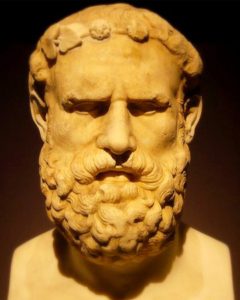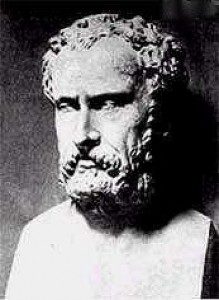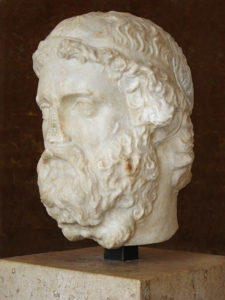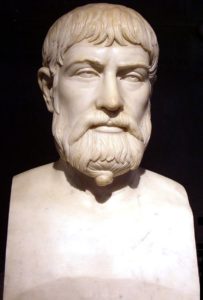
Greek Lyrics is book #5 from The Literary Project.
Greek Lyrics is a collection of poetic fragments that have survived for over 2 millennia. They are, as the name implies, lyric poems that are meant to be sung or spoken together with a lyre. The various poets’ lives span from the 7th to 5th centures BCE. What astonishes me more than anything, is the fact that the human condition has remained so fundamentally the same, with many of the same ideas and concerns written about then still occupying our minds today: friendship, love, death, money… We have, both, changed so much and so little.
Since this book is an anthology, I’ve decided that, for this essay, I’ll simply quote my favorite fragments from the compilation with a bit of commentary throughout.
My Favorite Fragments

Archilochus, ~680-640 BCE
Charon the Smith
Nothing to me the life of Gyges and his glut
of gold. I neither envy nor admire him, as
I watch his life and what he does. I want no pride
of tyranny; it lies far off form where I look.
The above lyric is about Gyges, a Lydian King. I love it because it’s so wise; the poet leads a good example for others in not envying nor admiring one who is richer and more powerful. I’m intrigued by the title, “Charon the Smith.” Charon is the ferryman who takes souls across the rivers Styx and Acheron to Hades. But to call Gyges Charon, and to call him a smith…he must be likening the king to someone who delivers death while dealing in gold. Perhaps that is the “tyranny” he is referring to. I can see why Archilochus would not want to envy or admire such a monstrous person, but I think my initial gut interpretation about not admiring or envying those richer and powerful, in general, is still a good takeaway piece of ancient wisdom–independent of the poem’s tyrannical subject.
On Friends Lost at Sea
Blaming the bitterness of this sorrow, Perikles, no man
in all our city can take pleasure in festivities:
Such were the men the surf of the roaring sea washed under,
all of us go with hearts aching against our ribs
for misery. Yet against such grief that is past recovery
the gods, dear friend, have given us strong endurance to be
our medicine. Such sorrows are variable. They beat now
against ourselves, and we take the hurt of the bleeding sore.
Tomorrow it will be others who grieve, not we. From now on
act like a man, and put away these feminine tears.
[emphasis added]
The part I emphasized is so telling of the ancient’s acknowledgement of the resilience of the human heart against pain and heartbreak, and of the impermanent nature of sorrow. Even then, we hurt; and even then, we could push through. Sorrow comes and goes.
Heart, my heart, so battered with misfortune far beyond your strength,
up, and face the men who hate us. Bare your chest to the assault
of the enemy, and fight them off. Stand fast among the beamlike spears.
Give no ground; and if you beat them, do not brag in open show,
nor, if they beat you, run home and lie down on your bed and cry.
Keep some measure in the joy you take in luck, and the degree
you give way to sorrow. All our life is up-and-down like this.
[emphasis added]
The only constant in life in change. All things are impermanent.
The fox knows many tricks, the hedgehog only one.
One good one.
Such is the passion for love that has twisted its way beneath
my heartstrings
and closed deep mist across my eyes
stealing the soft heart from inside my body…
Mimnermus, mid-7th to early-6th century BCE
What, then, is life if love the golden is gone? What is pleasure?
Better to die when the thought of these is lost from my heart:
the flattery of surrender, the secret embrace in the darkness.
These alone are such charming flowers of youth as befall
women and men. But once old age with its sorrows advances
upon us, it makes a man feeble and ugly alike,
heart worn thin with the hovering expectation of evil,
lost all joy that comes out of the sight of the sun.
Hateful to boys a man goes then, unfavored of women.
Such is the thing of sorrow God has made of old age.
What person today cannot resonate with the above? We all bemoan aging.

Solon, ~630-550 BCE
from Prayer to the Muses
…
The beginning of disaster is not much, as when a fire
burns small in its first stages and ends in catastrophe. As fire’s
course is, such is the course taken by human misdeeds.
…
But money; there is no end of its making in human endeavor.
Those among us who have already the biggest estates
try to get twice as much as they have. Who can satisfy all of them?
2,500 years later, we still have those ungrateful and greedy rich who are never satisfied and always want more.
from Political Verses
…
for Glut gives birth to Greed, when great prosperity suddenly
befalls those people who do not have an orderly mind
…
Acting where issues are great, it is hard to please all.
You just can’t make everyone happy! Solon couldn’t do it back then, and we simply cannot do it now.
from In Defense of His Policies
…
I put myself on guard at every side, and turned
among them like a wolf inside a pack of dogs.
I loved these two lines because of the imagery. I imagined Solon’s fighting wolf spirit surrounded by naysayers.

Xenophanes, ~570-480 BCE
The Athlete and the Philosopher
Now, supposing a man were to win the prize for the foot race
at Olympia, there where the precinct of Zeus stands beside
the river, at Pisa: or if he wins the five-contests, or the wrestling,
or if he endures the pain of boxing and wins, or that new
and terrible game they call the pankration, contest of all holds:
Why, such a man will obtain honor, in the citizens’ sight,
and be given a front seat and be on display at all civic occasions,
and he would be given his meals all at the public expense,
and be given a gift from the city to take and store for safekeeping.
But custom is careless in all these matters, and there is no justice
in putting strength on a level above wisdom which is sound.
For if among the people there is one who is a good boxer,
or one who excels in wrestling or in the five-contests,
or else for speed of feet, and this is prized beyond other
feats of strength that men display in athletic games,
the city will not, on account of this man, have better government.
Small is the pleasure the city derives from one of its men
if he happens to come first in the games by the banks of Pisa.
This does not make rich the treasure house of the state.
[emphasis added]
Wow. I read this and was amazed at how this is something that has not changed at all. Even today, as a culture, we idolize professional athletes while hardly knowing the names of those in political office.
Theognis, late-6th to 5th century BCE
…
pretend to all that you are their friend: talk as if you were one:
but never communicate to any one of these men
anything important.
…
This one makes me think of Shakespeare’s line: “Give every man thy ear, but few thy voice. Take each man’s censure, but reserve thy judgement.”
Spurious gold and silver are an endurable evil,
Kyrnos, and give no difficulty to the skilled man
to know what they are. But if the mind in a friend is secretly
false and he carries a heart of trickery hidden within,
this, of all God’s works among men, is the thing most spurious
and most evil, since such deception can never be seen.
Between these first two poems, I think he might’ve had some trust issues…
Try for nothing excessive. The middle degree is best. So, Kyrinos, you will win virtue, a difficult thing to attain.
I have been in my time as far as the land of Sicily,
I have been to Euboia, where vineyeards grow in the plain,
and Sparta, the shining city by the reedy banks of Eurotas;
and everywhere I was met with enthusiasm and love,
but my heart has taken no joy from the attentions of strangers.
A man’s own country is dearest. This is the truth in the end.
Reminds me of Odysseus: “I know no sweeter sight on earth than a man’s own native country.”

Sappho, ~620-550 BCE
I was very excited and surprised to see a woman poet when I got to Sappho! I admit I’d never heard of her before, and I just didn’t realize that any ancient Greek female poets existed. After reading this fascinating article from the New Yorker, I realized that Sappho is actually quite famous and respected: “the Greeks, in fact, seem to have thought of Sappho as the female counterpart of Homer: he was known as ‘the Poet,’ and they referred to her as ‘the Poetess.'” She was a native of the island of Lesbos, and was–due to some of her poems like the one I included here–thought to be gay (hence where the word “Lesbian” came from).
Like the very gods in my sight is he who
sits where he can look in your eyes, who listens
close to you, to hear the soft voice, its sweetness
murmur in love andlaughter, all for him. But it breaks my spirit;
underneath my breast all the heart is shaken.
Let me only glance where you are, the voice dies,
I can say nothing,but my lips are stricken to silence, under-
neath my skin the tenuous flame suffuses;
nothing shows in front of my eyes, my ears are
muted in thunder.And the sweat breaks running upon me, fever
shakes my body, paler I turn than grass is;
I can feel that I have been changed, I feel that
death has come near me.

Anacreon, ~560-490 BCE
Like a blacksmith the Love God has hammered me an crushed me
on his anvil, and has plunged me in a winter torrent.
An Anonymous Drinking Song (unknown poet)
He who never betrays one he has made a friend shall be given high
exaltation among people and gods. Such is my own belief.
Oh that it were given to us to open
up the heart of every man, and to read his
mind within, and then to close it,
and thus, never deceived, be assured of a friend.
These anonymous drinking songs make me think of Theognis and his distrust of others. Maybe there were just a lot of trust issues in general during ancient times…
Corinna, ~late-6th to early-5th centuries BCE
Here was lady #2 featured in this book!
To the white-mantled maidens
of Tánagra I sing my sweet lays.
I am the pride of my city
for my conventional singing.
Corinna was a contemporary of Pindar (below), and both counseled him and competed with him. Interestingly enough, she’s hypocritical in a bit of a Margaret Thatcher Syndrome-esque sort of way (I can be a powerful woman but I won’t tolerate others who are), because she criticizes another poetess for competing against Pindar just as she had done:
I dissapprove even of eloquent
Myrtis; I do, for she, a woman,
contended with Pindar.
Simonides, ~556-468 BCE
Being no more than a man, you cannot tell what will happen tomorrow,
nor, when you see one walk in prosperity know for how much time it will be.
For overturn on the light-lifting wings of a dragonfly
is not more swift.
Another poet on the truth of impermanence. Love it.

Pindar, ~522-446 BCE
…
What is near home, city and heart
and kinship, this gives a man something to stay
and love, and the passion for what is far away
belongs to vain fools.
…
War is sweet to those who have not tried it. The experienced
man is frightened at the heart to see it advancing.
Do not against all comers let break the word that is not needed.
There are times when the way of silence is best; the word in its power
can be the spur to battle.
Pindar seems to dish out some serious wisdom in general: love your city and loved ones, fear war, and watch your words.
Bacchylides, ~5th century BCE
…
Still, seeing there will be no advantage
got for us in mourning these matters,
we should put our minds to that which we may get gone.
…
…The deep
of the sky stains not. The water of the sea
is not dirtied with rot. Gold fights tarnish.
But it is not allowed for a man to pass
where age is gray, and then once more recover
strong youth. Yet there is no diminution
in man’s good, his light, as the body goes. Still
the Muse sustains him.
…
